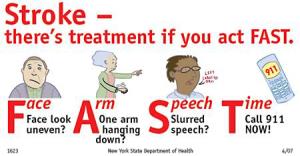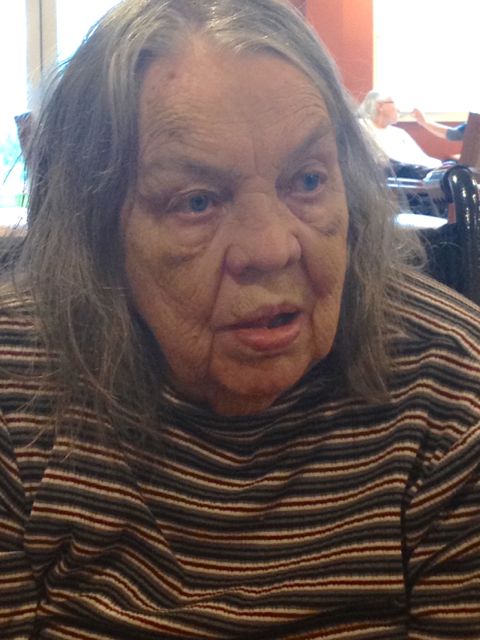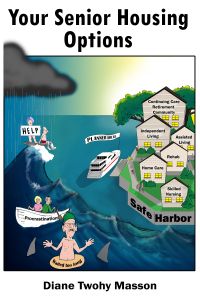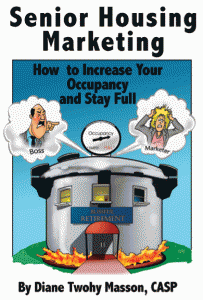Marketing 2 Seniors | The Blog
with Author: Diane Masson
Do You Know Someone With Dementia That Drives?
What about you? Does one of your loved ones have dementia and still drive? Dementia drivers are jeopardizing other citizens walking in crosswalks and driving.
My father-in-law was driving with a diagnosis of macular degeneration. He justified his actions by only driving in the daytime and limiting himself to a 5-mile radius to run errands and go the doctor. As his dementia progressed he got lost driving home within this radius. He chose to give up driving on his own.
A friend told me about my mother driving several years ago. They said, “I saw your mom driving today, she can’t even see over the steering wheel. She is looking through the steering wheel in order to see the road.” I was horrified. This was completely unsafe. I still vividly remember the last time I drove with my mom. She was straddling two lanes (on the same side of the road). She said, “Diane, I know this looks bad, but I know exactly what I am doing.” I was terrified. It was the beginning of her dementia.
A resident of a senior living community drove into another resident’s balcony. As he was parking the car, the senior hit the gas instead of the brake. After backing up, he made the same mistake again and rammed the balcony a second time. Afterwards, he was disoriented and could not remember how the accident happened or why he hit the gas twice. He did not give up his car keys after this incident. The resident whose balcony was destroyed requested to have the parking place right outside his apartment home, because he did not want a repeat performance.
All these senior driving circumstances have made me a better defensive driver. Many people are concerned about teenage drivers, but what about seniors with dementia? No senior wants to give up the keys to the car and lose their independence. Senior housing choices that provide transportation can be a good choice for a senior who should not be driving.
Do you feel that a son or daughter should make a mom or dad give up the car keys if they are putting others at risk? What will be the trigger event to make the decision of no more driving – hitting a curb, a fender bender, or a fatal car accident?
What should the doctor’s role be in this process? Have you had the “car talk conversation” with yourself, your spouse, or your parent? How did it go? What about senior living providers who have residents that are driving unsafely in their parking lots? What did you do?
Seniors, Boomer children, spouses, family members and caregivers are desperate to learn how to truly differentiate good senior housing from mediocre at best. Diane Masson’s new book will answer these heart-wrenching issues in an easy, simple, story telling format with humorous illustrations. She has represented multiple styles of senior housing for 16 years and has sought all levels of senior housing care for her mother and stubborn German in-laws.
“Your Senior Housing Options” is a new resource book available on Amazon.com with a 5-star rating. It offers a step-by-step guide to the options, including staying home. Don’t wait until you’re in a health care crisis like author Diane Masson’s in-laws. Learn how to plan ahead like Masson’s mom. Research your future choices NOW to avoid being “put” somewhere, or having decisions made for you by others.
For weekly tips and advice go to www.Tips2Seniors.com and learn more from author and senior housing expert Diane Twohy Masson.
“Doesn’t Medicare Pay for Long-term Care?”
 Many seniors believe Medicare will take care of everything. It is an unfortunate perception that is inaccurate. Two days ago, I was presenting senior living options to a group of seniors. One senior raised their hand and asked how Medicare fit in the picture of paying for senior housing.
Many seniors believe Medicare will take care of everything. It is an unfortunate perception that is inaccurate. Two days ago, I was presenting senior living options to a group of seniors. One senior raised their hand and asked how Medicare fit in the picture of paying for senior housing.
Here was my answer, “You have worked hard your whole life to have Medicare insurance. Most seniors have Medicare, a HMO and supplemental insurance. These will help you pay for doctors, hospital stays and up to 100 days of skilled nursing care (if you have a qualifying hospital stay). Medicare will not pay for any long-term care such as support in an assisted living community, long-term skilled nursing care or memory care. (I know this was a short version of a long answer.)
Many seniors were surprised…here is some info from Medicare:
“At least 70 percent of people over 65 will need long-term care services and support at some point. ‘Medicare and most health insurance plans, including Medicare Supplement Insurance (Medigap) policies, don’t pay for this type of care, sometimes called ‘custodial care.’ Long-term care can be provided at home, in the community, in an assisted living facility, or in a nursing home. It’s important to start planning for long-term care now to maintain your independence and to make sure you get the care you may need, in the setting you want, in the future.” This is a quote from the official Medicare and You 2014 Handbook, page 63.
Have you encountered this misperception that Medicare will pay for long-term care?
Diane Twohy Masson’s new guide book for seniors, “Your Senior Housing Options,” is available on Amazon.com with a 5-star rating. It reveals a proactive approach to navigating the complex maze of senior housing options. It will help you understand the costs and consequences of planning ahead or waiting too long. Learn firsthand tips from someone who is currently advocating for three aging parents.
Among the thousands of seniors she and her teams have assisted in finding the right senior living community, the most difficult case has been helping her own parent. Masson spent two years exploring senior housing options with her mother before finding the ideal Continuing Care Retirement Community for her. After eight years in this independent living setting, she helped her mother transition into an assisted living community. Seven years later, even as a senior housing expert, Masson struggled with the decision to move her mother into a skilled nursing community.
More related articles by Diane can be found at Tips2Seniors.com or like Tips 2 Seniors on Facebook.
Diane Twohy Masson has worked in senior housing since 1999. She is an award-winning certified aging services professional and the author of Senior Housing Marketing: How to Increase Your Occupancy and Stay Full for senior living professionals.
Witnessing a Mini-Stroke (TIA)
My sister-in-law witnessed my father-in-law, Bill, having a mini-stroke (TIA) this week. What a heartbreaking story. She was sitting with him in the living room and noticed his face droop on one side. Then his speech became garbled. It was over in two minutes and he could talk fine again. He had no idea it happened.
She was understandable traumatized and wanted to talk about it. My husband and I are 1000 miles away and applaud her efforts to care for my father-in-law in her own home till he passes. We both think she is a saint.
Through my Internet research it says a TIA is a mini-stroke. TIA’s can be warnings that a bigger stroke can be coming. In my mom’s case, she has had so many TIA’s that she has been diagnosed with vascular dementia. I have never personally witnessed a TIA with my mom.
I guess you could say we were lucky it was only a TIA with Bill. Unfortunately, my father-in-law is now on hospice. Hospice is comfort care, so the goal is no hospitals or ambulances if at all possible.
Every caregiver, family member and senior living professional should know the signs of a stroke and what to do. Stokes can cause permanent damage. If you get someone to a hospital in time, it can reverse the affects of the stroke. Go to www.strokeassociation.org to learn more. They say you should act FAST! FAST stands for: face drooping, arm weakness, speech difficulty and time to call 911.
Have any of you encountered or witnessed a TIA or stroke?
Diane Twohy Masson’s new guide book for seniors, “Your Senior Housing Options,” is available on Amazon.com with a 5-star rating. It reveals a proactive approach to navigating the complex maze of senior housing options. It will help you understand the costs and consequences of planning ahead or waiting too long. Learn firsthand tips from someone who is currently advocating for three aging parents.
Among the thousands of seniors she and her teams have assisted in finding the right senior living community, the most difficult case has been helping her own parent. Masson spent two years exploring senior housing options with her mother before finding the ideal Continuing Care Retirement Community for her. After eight years in this independent living setting, she helped her mother transition into an assisted living community. Seven years later, even as a senior housing expert, Masson struggled with the decision to move her mother into a skilled nursing community.
More related articles by Diane can be found at Tips2Seniors.com or like Tips 2 Seniors on Facebook.
Diane Twohy Masson has worked in senior housing since 1999. She is an award-winning certified aging services professional and the author of Senior Housing Marketing: How to Increase Your Occupancy and Stay Full for senior living professionals.
Evaluating Memory Care or Assisted Living Community Costs
Finding an affordable memory care or assisted living community can be a daunting task. Even this senior housing guru had to plan strategic questions before touring four memory care communities for my mother-in-law. See the questions HERE.
My husband and I flew 1000 miles to Seattle. We only had two days to tour memory care communities in the Seattle area. This required researching the Internet, calling former senior housing colleagues for recommendations and scheduling tours before we left. The timing was tricky because our limited time included visiting with my husband’s mom.
My husband created a spreadsheet to compare costs between these four memory care communities. The pricing is so complex that even someone working in the senior living field (like me) had trouble figuring out the monthly cost for my mother-in-law.
Care points, care levels or all inclusive costs?
Most assisted living and memory care communities seem to have a charge for room and board, then additional costs for care. Pricing can be very gray and feels like an illusion of smoke and mirrors. Care costs can be priced on a point system or a level system.
My mother-in-law, Amy, was assessed at 223 points at her current memory care community. Care costs varied dramaticly. Some of our tour guides were actually guessing what level of care or point total she might be, before a nurse could assess her. This is what makes pricing difficult to compare. The community recommends that you to move her in and then they will figure out the monthly price. Sigh…
Here were the room and board costs of four memory care communities in the Seattle area (these prices do not reflect care costs):
Community A Private Room: $2,330
Community B Private Room: $5,095
Community C Private Room: $4,050
Community D Private Room: $4,137
Room and board costs for a shared room in memory care are less:
Community A Shared Room: $1,050
Community B Shared Room: $4,895
Community C Shared Room: $2,850
Community D Shared Room: $3,837
So let’s try to figure out care costs:
Community A has four care levels: Amy’s current care level two (estimate) – $3,860
Community B has five care levels: Amy’s current care level three (estimate) – $2,595
Community C uses care points: Daily charge .54 a point x 223 = $3,613
Community D uses care points: Daily charge .73 a point x 223 = $4,884
So the price is so high, we decide to consider a shared room. So let’s add the shared room with the care costs to see what Amy would be charged each month:
Community A – Amy’s monthly total: $4,910
Community B – Amy’s monthly total: $7,490
Community C – Amy’s monthly total: $6,463
Community D – Amy’s monthly total: $8,721
Each place said it would reassess Amy in two weeks. They implied the price would bump down, but it might bump up in price. Right?!!? So that led us to ask what could be the maximum cost for Amy’s care in a shared room?
Community A – Amy’s maximum cost: $6,820
Community B – Amy’s maximum cost: $9,045
Community C – Amy’s maximum cost: $9,006
Community D – Amy’s maximum cost: $12,159
Community D was priced the highest, but it also had the highest staff ratio and was a drop-dead gorgeous new building. We had to eliminate it due to Amy’s finances. Community A was priced the lowest and had a wait list. It was cheaper, but gross and we saw a low staff ratio. So that left us Community B or C. Community B had a care level pricing and was brand new. Community C was based on care points and was a dated older community. This is where our spreadsheet came in handy.
The bottom line for the family: Amy’s care was more important than a new community that looked great walking in the lobby. We felt Community C had outstanding personnel! Every single person greeted us on our tour. They painted the picture of Amy’s reality, but explained how they would provide the best care in a homey environment. We felt they were experienced enough to correct Amy’s medications that had been over prescribed at the hospital (You can read about drugging and diapering seniors HERE.).
So Community C will initially cost the family around $6,000 a month, plus the one time community fee. They assessed Amy the same day we toured (another example of excellent service) and determined that 223 points was too high. Her new assessment is less than 200 points.
One-Time Community Fee
Assisted living and memory care communities typically have a community fee (one time) when someone moves in. Here were the memory care community fees for the four places we toured:
Community A: $2,500
Community B: $4,895
Community C: $6,500
Community D: $10,433
It’s complicated to compare senor-housing options; I hope this information can help you. Some other assisted living and memory care communities are all inclusive and only charge extra for incontinence care. Do your own research. Cheaper does not always mean better. Look beyond the superficial newness to the quality of the nursing and caregiver staff. Don’t forget to ask about turnover of staff. Community C has two key staff that have worked over 10 years for the company.
What have you encountered?
I haven’t even discussed who can afford these expensive prices? What about poverty level seniors? What happens when a senior runs out of money? Why is Medicaid almost impossible to find at licensed assisted living communities? These questions are addressed in my new book, “Your Senior Housing Options.” It is available on Amazon.com with a 5-star rating.
Drugging and Diapering Seniors??
Apparently drugging and diapering seniors in the hospital is common knowledge in higher levels of senior living care, such as assisted living, memory care and skilled nursing?!!?
This is horrifying new knowledge for me. I am all about exposing dirty secrets in my new book, “Your Senior Housing Options.” So let me share what I have recently learned through my mother-in-law’s experience. My mother-in-law, Amy, has dementia and was cared for by my father-in-law for the last several years. Three days after he had a heart attack, she became psychotic. My husband and I had to hire a geriatric care nurse to help her because we live 1000 miles away. Learn more of the story HERE.
It took over two weeks to get Amy admitted to the hospital (it’s a long story). Initially, we were relieved that she was going to get the psychotropic drugs she needed. Since Amy was in crisis mode, we didn’t dwell on her being diapered because of diarrhea. She’d had colon cancer 25 years ago and has self-managed her own colon care with diarrhea medications for years.
Costs for Incontinence
As she was in the process of transferring to a secured memory care, I was promised that they would be diligent about avoiding Amy’s trigger foods (that cause the diarrhea). My assumption was that she would surely regain continence again. This was vitally important, because incontinence can cost an additional $300 to $1,000 per month depending upon the assisted living community.
My Mother-in-law Was Over Sedated
We flew to Seattle to see Amy and to help find a reasonably priced memory care community for her. She was so sedated that she could not keep her eyes open and kept saying, “I am so tired,” over 25 times. She apologized that she needed to lie down and take a nap. She was in a wheelchair and needed a one person transfer to get in bed. What?!!? One month ago, she was walking around. My husband and I were shell-shocked to see her so drugged and lethargic. We talked to the memory care community and they said they would contact the doctor immediately to reduce the medications.
The next day, we arrived to see Amy again. After being told that she was engaged and walking around, we found her asleep in a wheelchair in the middle of a singing class. It was heart wrenching to witness. Again, she spoke of her sleepiness.
Advocacy is Key for a Senior with Dementia
The administrator came over and had the nerve to tell me, “My team feels we should follow the doctor’s recommendation of not changing Amy’s drugs for one or two months.” What?!!? I asked the nurse, “Do you see Amy’s lip trembling?” She said, “Yes.” I inquired if she saw both of Amy’s arms shaking too. She agreed. Then I said, “Do you see how sleepy she is and how her eyes can’t stay open?” “Yes,” she said. I simply said, “That is not Amy.” “Oh,” she said, “Then she is on too much medication.” “Exactly,” I said and was relieved that someone finally understood.
It took till the next evening for the community to contact her doctor and reduce one of her medications by half.
At this point Amy has been drugged and diapered for five weeks (between the hospital and the memory care community).
Conclusion:
That was five weeks too much of over drugging and diapering a senior with dementia. Can she ever come back and resume continence again? Will she be able to walk freely like she used to in her own home? My own mother was given psychotropic medications in skilled nursing care. Four months later, her walking had decreased dramatically; a few months later she became wheelchair bound for life. Was it the drugs or aging decline? I will never know, but I want to protect my mother-in-law from being over sedated and permanently wheelchair bound. I hope she has a fighting chance to walk again.
Drugs as Restraints?
I have talked with several administrators of assisted living and skilled nursing communities. They say it is common for seniors to arrive from the hospital drugged and diapered. The hospital can’t use restraints, so they use drugs as restraints. My mother-in-law was prescribed haloperidol twice a day and trazodone four times a day as needed. Why did the hospital dope her up so much? It is an advocacy nightmare to get it reversed.
What have you encountered? Has you ever witnessed the sedation and diapering nightmare of a senior?
Diane Twohy Masson’s new guide book for seniors, “Your Senior Housing Options,” is available on Amazon.com with a 5-star rating. It reveals a proactive approach to navigating the complex maze of senior housing options. It will help you understand the costs and consequences of planning ahead or waiting too long.
More related articles by Diane can be found at Tips2Seniors.com or like Tips 2 Seniors on Facebook.
Diane Twohy Masson has worked in senior housing since 1999. She is an award-winning certified aging services professional and the author of Senior Housing Marketing: How to Increase Your Occupancy and Stay Full for senior living professionals.
Among the thousands of seniors she and her teams have assisted in finding the right senior living community, the most difficult case has been helping her own parent. Masson spent two years exploring senior housing options with her mother before finding the ideal Continuing Care Retirement Community for her. After eight years in this independent living setting, she helped her mother transition into an assisted living community. Seven years later, even as a senior housing expert, Masson struggled with the decision to move her mother into a skilled nursing community.
New Book “Your Senior Housing Options” Available
“Your Senior Housing Options” is available now on Amazon.com.
As we age, it’s never easy to face the prospect of what to do when we need living assistance. But the reality is that two-thirds of today’s seniors will eventually need long-term care, with 20 percent needing it for longer than five years. If you are a retirement-age baby boomer or senior, don’t wait for a health crisis to occur. You owe it to yourself—and your family—to plan for the future today.
Although we’ve all heard horror stories, great facilities where residents are treated like gold are out there. How do you find them? You have to do your homework, ask the right questions, and look beyond the superficial to find what’s right for you.
With experience as both an industry expert and a loving daughter, Diane Twohy Masson is passionate about helping seniors find the retirement community that fits their price range, lifestyle, and needs. This brand new guidebook offers a proactive approach to navigating the complex maze of senior housing options. It will help you understand the costs and consequences of the various possibilities including home care, independent living, assisted living, group homes, memory care, and skilled nursing care facilities.
Order a copy of this valuable new resource by clicking HERE.
A valuable source of information by someone who works in the trenches. Whether you or a loved one are currently facing challenges, or if you simply want to be prepared for what you may face in the future, this provides the necessary tools. Knowledge is power.
Steve Fairfax, Currently helping my neighbor who has dementia
Diane answers questions most of us have not even thought of but desperately need to know. You will find valuable insight into the later years of life.
Dr. Jim Gwinn, Former President, CRISTA Ministries
As accountants, we can crunch the numbers. But Diane has outlined many issues we would never know, but which clearly need to be considered. This is an important resource in understanding key senior living issues.
Craig Huish, CPA, Waterfront CPA Group
Diane Twohy Masson has worked in senior housing since 1999. She is an award-winning certified aging services professional and the author of Senior Housing Marketing: How to Increase Your Occupancy and Stay Full for senior living professionals.
Among the thousands of seniors she and her teams have assisted in finding the right senior living community, the most difficult case has been helping her own parent. Masson spent two years exploring senior housing options with her mother before finding the ideal Continuing Care Retirement Community for her. After eight years in this independent living setting, she helped her mother transition into assisted living community. Seven years later, even as a senior housing expert, Masson struggled with the decision to move her mother into a skilled nursing community.
For more information, visit: www.tips2eniors.com or follow Tips 2 Seniors on Facebook.
Finding Affordable Memory Care for Mom
My mother-in-law is currently in a secured memory care community. The price is very high – $6750 for 30 days of respite care. If we don’t move her within two weeks, the community fee for a permanent stay will be $10,000 and her monthly fee will be $9,000 a month. Are you kidding me? Who can afford this?
She was living in her own home six weeks ago, but a crisis you can read about HERE has left her adult children scrambling to find a permanent solution for my mother-in-law.
My husband, Chris, and I work in the senior housing profession, so who is better than us to evaluate the choices. We flew 1000 miles yesterday to be the experts on the ground in Seattle. We are going to visit three memory care communities today and one or two tomorrow. The best way to evaluate and compare retirement communities is in a short span of time. The crème always rises to the top.
We can’t base our decision on what the community looks like, the size of the rooms or the wonderful sales person. We are going to dig deeper and ask the following questions of each memory care community:
- What is the staff turnover? We want to see longevity of staff – particularly in the administrator, nurse, caregivers and possibly the chef.
- Do the staff and residents look happy? We will talk to some of each.
- What will be my mother-in-laws quality of life? What programming is offered? How often does live entertainment come in the building? How will they minimize her anxiety?
- How many hours does the nurse work per day? Twenty-four hours will always be the best answer, but you get what you pay for.
- What is the procedure if my mother-in-law falls? When my mom was in an assisted living community with dementia, every fall led to a terrifying emergency room (ER) visit that was stressful for her. If a nurse is on shift around the clock, it may save my mother-in-law from this stress. If the fall happens at 2:00 am and only a caregiver is on staff, the call to 911 will almost always lead to the terrifying ER visit.
- Do doctors come and visit my mother-in-law here or does she have to be driven to her doctor? Who will do that? Will someone accompany her? What are the costs?
- We will discuss my mother-in-law’s dietary needs and meet the chef. When my mother-in-law was in the hospital, she became incontinent. We hope it is not permanent and assume the diarrhea was from feeding her too many raw vegetables and fruit. She has not eaten those in years because of too much radiation after colon cancer. So it is important that we advocate for her in this regard. Just incontinence can cost an additional $1,000 a month.
- What is the initial community fee? What is the current monthly cost for room, board and care? What is the maximum cost it could potentially be? What are the additional costs? What have we not asked that could cost extra? What happens when someone is broke and can’t pay these hefty fees? We need to find out if the memory care community charges for my mother-in-law’s care by points, levels of care, or is all-inclusive. Pricing can be very grey and it is easy to be confused. Even us experts will have to see beyond the sales “smoke and mirror” answers.
- What is the history of their year over year monthly increases? We can’t just look at affordable costs today, but what if my mother-in-law lives for years?
- Is the room furnished? Do we just bring personal affects? Do we need to go buy a twin bed, TV or special chair?
- How do they handle hearing aids and glasses? My mother-in-law has two hearing aids that she has not used in six weeks.
- What is their procedure in contacting the family to give updates or let us know of a change in our loved one’s health?
- Is there anything that we should have asked but did not?
We will look at the entire memory care community space, her possible room and the outside walking area. I will keep you posted on our family evaluation and pricing for these communities. Hopefully, sharing my experiences and tips can help you too.
Diane Masson’s new guide book for seniors, “Your Senior Housing Options,” will be available next week on Amazon.com. If you sign up for my weekly newsletter on the right side of this blog, you will be notified when this valuable resource can be purchased. Check out my new website: Tips2Seniors.com or please follow me on Facebook.
Diane Twohy Masson is the author of “Senior Housing Marketing – How to Increase Your Occupancy and Stay Full,” available at Amazon.com with a 5-star rating. The book is required reading at George Mason University as a part of its marketing curriculum. Within this book, the author developed a sales & marketing method with 12 keys to help senior living providers increase their occupancy. Masson developed this expertise as a marketing consultant, sought-after blogger for senior housing and a regional marketing director of continuing care retirement communities in several markets. She has also been a corporate director of sales and a mystery shopper for independent living, assisted living, memory care and skilled care nursing communities in multiple states. Currently, Masson is setting move-in records as the regional marketing director of two debt-free Continuing Care Retirement Communities in Southern California – Freedom Village in Lake Forest and The Village in Hemet, California. Interestingly, this career started when she was looking for a place for her own mom and helped her loved one transition through three levels of care.
© Marketing 2 Seniors| Diane Twohy Masson 2015 All Rights Reserved. No part of this blog post may be reproduced, copied, modified or adapted, without the prior written consent of the author, unless otherwise indicated for stand-alone materials. You may share this website and or it’s content by any of the following means: 1. Using any of the share icons at the bottom of each page. 2. Providing a back-link or the URL of the content you wish to disseminate. 3. You may quote extracts from the website with attribution to Diane Masson CASP and link https://www.marketing2seniors.net For any other mode of sharing, please contact the author Diane Masson.
Worried Sick 1000 Miles Away (part 2)
Last week I shared the trauma of an adult child witnessing two parents in crisis at the same time. You can read about that here. Originally my father-in-law, Bill, had been hospitalized from a heart attack and was now going to be discharged from a skilled nursing care community. My mother-in-law, Amy, has Alzheimer’s. She had a psychotic break after her husband Bill was hospitalized and was to be released from the locked psych ward at a hospital on the same day. The local children requested that their mother’s release be postponed till they settled the dad.
So we had one week to find a quality memory care community that was secure (locked so a senior with dementia or Alzheimer’s can’t wander into the street and be injured or killed). My husband and I had done our homework to find a senior living community that would be appropriate for Amy (we started our senior housing careers in Seattle).
Admission requirements
Admission to any senior living community usually requires the senior, family and/or the Power of Attorney (POA) to fill out paperwork to show financially responsibility, an assessment of the future resident’s medical records and an in-person interview.
Coordinating an admission from the hospital
My husband, Chris, and I had coordinated with a locked memory care community that had an excellent reputation and was located by a local son. It was perfect. They called us on that Monday and told us they were full. Now what? They said no worries we have a sister community who has a room. We said okay. By Tuesday night the sister community had not done an assessment and we wanted Amy moved before the weekend. Why should she stay at the hospital when she had graduated out of needing it?
We decided to be proactive and spoke with two more memory care communities who would take Amy. Chris and I asked his brother to compare these two memory care communities by touring them and seeing residents and staff for himself. With a map and cell phone in hand, the local brother set out to locate the first community. After two hours, he could not find it, so he gave up and went home. He never called us till that evening. So we wasted a day. On Thursday, we gave the same local brother detailed directions to find the two memory care communities and sent him to find and compare both places. He only found the memory care community he couldn’t find the day before. He toured the sister community, which had still not assessed Amy for four days. It did not look great. Now what? It was scramble time.
I called a secure memory care in Seattle who was referred to me by a previous co-worker. It was 15 miles further away. The community was 100 percent responsive and said they could assess Amy the next morning (Friday AM) and if everything worked out have her placed by Friday evening. Whew!!! We had a family conference on the phone that lasted till 10:00 PM. The location was not ideal, but all three children were on board and we had a plan.
On Friday AM, the secure memory care in Seattle called the local son who is the POA to gain access to Amy’s records. He said, “Oh, I thought another community was assessing her?” The community texted my husband Chris and he had to leave an event with 65 seniors attending to keep the assessment on track. The local son had slowed down this assessment process with a single question. He never realized what he had done.
The secure memory care in Seattle assessed her at 1:00 PM and still had three questions to get answered before they accepted her. Why did Amy hit the nurse, why were the police called several times and why were other communities rejecting her? I explained everything including the fact that one memory care was full and that the sister community was not assessing her in a timely fashion.
The secured memory care in Seattle accepted her by 2:00 PM, but the hospital told them that they would be short-staffed this holiday weekend and it would be easier to process Amy’s release on Tuesday. Are you kidding me? Chris coached his brother (the POA) what to say to the hospital, so we could get Amy released on Saturday AM or Monday AM. The hospital said, “No, we will release her on Tuesday.” Really??? This is wrong!
So why did the hospital not release her? Keeping the occupancy up? Lazy? My poor mother-in-law is literally trapped in a short-staffed institution for four more days. The injustice of this situation has plainly made me ill and I am fighting a horrible cold.
Diane Masson’s new guide book for seniors, “Your Senior Housing Options,” will be will be coming soon to Amazon.com. If you sign up for my weekly newsletter on the right side of this blog, you will be notified when my new book becomes available. Check out my new website: Tips2Seniors.com or please follow me on Facebook.
Diane Twohy Masson is the author of “Senior Housing Marketing – How to Increase Your Occupancy and Stay Full,” available at Amazon.com with a 5-star rating. The book is required reading at George Mason University as a part of its marketing curriculum. Within this book, the author developed a sales & marketing method with 12 keys to help senior living providers increase their occupancy. Masson developed this expertise as a marketing consultant, sought-after blogger for senior housing and a regional marketing director of continuing care retirement communities in several markets. She has also been a corporate director of sales and a mystery shopper for independent living, assisted living, memory care and skilled care nursing communities in multiple states. Currently, Masson is setting move-in records as the regional marketing director of two debt-free Continuing Care Retirement Communities in Southern California – Freedom Village in Lake Forest and The Village in Hemet, California. Interestingly, this career started when she was looking for a place for her own mom and helped her loved one transition through three levels of care.
© Marketing 2 Seniors| Diane Twohy Masson 2015 All Rights Reserved. No part of this blog post may be reproduced, copied, modified or adapted, without the prior written consent of the author, unless otherwise indicated for stand-alone materials. You may share this website and or it’s content by any of the following means: 1. Using any of the share icons at the bottom of each page. 2. Providing a back-link or the URL of the content you wish to disseminate. 3. You may quote extracts from the website with attribution to Diane Masson CASP and link https://www.marketing2seniors.net For any other mode of sharing, please contact the author Diane Masson.
Worried Sick 1000 Miles Away (part 1)
Aging parent’s decisions can drive us crazy or make us sick. When a parent with dementia stubbornly chooses to stay home, it can be heart breaking for the adult children. Watching a senior’s vitality fade is hard enough. But for an adult child to witness a parent’s poor hygiene, lack of nutrition by eating frozen dinners (not fresh food) and to see the absence of good judgment is tough and sad.
Some of us never get sick. Yet here I am, literally worried sick about my in-laws. A month ago my father-in-law, Bill, had a heart attack. My mother-in-law, Amy, with dementia was left alone for the majority of three days and nights as the local children rallied around the dad at the hospital. They did make sure she had food and medications. My husband and I hired a geriatric nurse to evaluate and help Amy. The nurse was to be our eyes and ears, since we live 1000 miles away. By the time the nurse intervened, Amy had become psychotic and had trouble recognizing her own children.
To make a long story short – my father-in-law never wanted to move to a retirement community or assisted living. He actually told my husband and I (working in the senior living business) that he understood that he would be waiting for a health crisis.
Well a crisis is one parent in the hospital and we had two. Over the last month, Bill improved enough to graduate from the hospital, to rehabilitating in skilled nursing care, to living permanently with his adult daughter in her home. He was told by professionals that he could no longer be Amy’s caregiver (he had been her caregiver for five years) and would need help for himself 24-hours a day. Pneumonia and a fall preceded the heart attack and now he has trouble catching his breath if he overexerts himself in any way and can’t remember to take his own medications because of dementia.
Let me fast forward on Amy’s simultaneous crisis. Amy’s Alzheimer’s prevented her from grasping that her husband of 65 years was in the hospital. She eloped (I think she walked away to search for her missing husband and ultimately the police found her) and hit a nurse in her confusion and anxious state. The police took her to the hospital and she resided in the emergency room for two days because they did not have a bed in the locked area. This is the part I don’t even want to imagine because I know they must have had to sedate her completely because she was an elopement risk.
A week later, both the skilled nursing community where Bill was getting rehab and the hospital where Amy resided wanted to discharge them simultaneously. The local children said that was impossible and they had to be discharged one at a time. So Bill was released first. Our goal was to have Amy placed in a quality secured memory care by the end of the next week. That week ended two days ago on Friday. Now it’s a holiday weekend and she is stuck in a locked psych ward in a hospital. Amy could have been discharged on Friday afternoon. The injustice of it all has made me sick. Next week I will share why Amy was not released – you will be shocked and disgusted.
Diane Masson’s new guide book for seniors, “Your Senior Housing Options,” will be will be coming soon to Amazon.com. If you sign up for my weekly newsletter on the right side of this blog, you will be notified when my new book becomes available. Check out my new website: Tips2Seniors.com or please follow me on Facebook.
Diane Twohy Masson is the author of “Senior Housing Marketing – How to Increase Your Occupancy and Stay Full,” available at Amazon.com with a 5-star rating. The book is required reading at George Mason University as a part of its marketing curriculum. Within this book, the author developed a sales & marketing method with 12 keys to help senior living providers increase their occupancy. Masson developed this expertise as a marketing consultant, sought-after blogger for senior housing and a regional marketing director of continuing care retirement communities in several markets. She has also been a corporate director of sales and a mystery shopper for independent living, assisted living, memory care and skilled care nursing communities in multiple states. Currently, Masson is setting move-in records as the regional marketing director of two debt-free Continuing Care Retirement Communities in Southern California – Freedom Village in Lake Forest and The Village in Hemet, California. Interestingly, this career started when she was looking for a place for her own mom and helped her loved one transition through three levels of care.
© Marketing 2 Seniors| Diane Twohy Masson 2015 All Rights Reserved. No part of this blog post may be reproduced, copied, modified or adapted, without the prior written consent of the author, unless otherwise indicated for stand-alone materials. You may share this website and or it’s content by any of the following means: 1. Using any of the share icons at the bottom of each page. 2. Providing a back-link or the URL of the content you wish to disseminate. 3. You may quote extracts from the website with attribution to Diane Masson CASP and link https://www.marketing2seniors.net For any other mode of sharing, please contact the author Diane Masson.
Self-destructive, stubborn, selfish or stupid?
Don’t we all know a friend or parent who fits the description of self-destructive, stubborn, selfish or stupid? What do you do? Love them or fight them? How can you help someone who refuses to believe there is a problem? You can’t make a parent be compliant with his or her doctor and you can’t force a senior to move into a higher level of care.
As seniors age, medical problems tend to increase. All sorts of progressive diseases can ravage a senior’s body and create havoc mentally and physically.
Uncooperative Parent?
My friend Grace’s dad has been defiant about his dialysis treatments for seven years. Dialysis is a medical procedure for people whose kidneys are failing. The treatment helps clean your blood and remove toxins from the body. If you refuse treatment you die a painful death.
Richard is supposed to have dialysis three times per week. His pattern of behavior is to refuse treatment till he is in crisis mode and has to be hospitalized. Then he feels good, skips a treatment, toxins build in his body, and he goes back into crisis mode again.
When Richard does not show up for his dialysis, they call his adult daughter who lives 45 minutes away. She used to drop everything including walking away from work to plead with her dad to accept treatment. Sometimes her waterworks of tears would be effective and other times he still refused treatment. Crisis calls every week for seven years is a long time. Anyone of us would be burned out. The police have called my friend and threatened her with elder abuse if she does not get her dad to comply with treatment. Seriously? This man has a right to refuse treatment, even with dementia. How can his daughter be held responsible for his lack of treatment?
- The dad has refused to sign a Power of Attorney (POA).
- The dad has refused to go in the ambulance when it has arrived on numerous occasions to take him to dialysis treatment.
- The dad refused to move to assisted living on the doctor’s recommendation.
- The dad refused to move to skilled nursing care on the doctor’s recommendation.
- The doctor called adult protective services and they have done nothing.
- The daughter asked adult protective services to make her the conservator of her dad and they said no.
This scenario has been going on for seven long years! My heart goes out to my friend. Do you think her dad is self-destructive, stubborn, selfish or stupid? Do you have any thoughts or advice?
Diane Masson’s new guide book for seniors, “Your Senior Housing Options,” will be will be coming soon to Amazon.com. If you sign up for my weekly newsletter on the right side of this blog, you will be notified when my new book becomes available. Check out my new website: Tips2Seniors.com or please follow me on Facebook.
“Your Senior Housing Options,” is dedicated to my mother, whose stories are peppered throughout. Being her advocate for over ten years has taught me to be a better person. My mom has dementia, but I am truly blessed that she still calls me by name. Her smile and joy inspires me to see the positive side of life. It makes me want to reach out and help seniors and their families make better choices today so they can have more secure long-term care plans tomorrow.



















